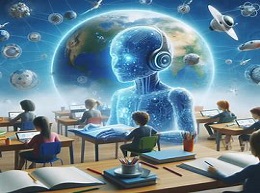AI in Remote Education: Bridging Gaps in Learning

The COVID-19 pandemic has accelerated the adoption of remote education, highlighting both its potential and its challenges. However, with the integration of artificial intelligence (AI) into remote learning platforms, educators can now leverage advanced technologies to personalize learning experiences, engage students effectively, and bridge gaps in learning regardless of geographical barriers. In this article, we'll explore the role of AI in remote education, examining its applications, benefits, and impact on the future of learning.
Personalized Learning with AI
AI-powered remote education platforms use machine learning algorithms to analyze student data, assess learning styles, and tailor educational content to individual needs. By personalizing learning experiences, AI helps students learn at their own pace, address learning gaps, and achieve better outcomes.
Example: Khan Academy's Adaptive Learning Platform
Khan Academy's adaptive learning platform uses AI algorithms to analyze student performance and adaptively recommend personalized learning resources and exercises. By identifying areas where students need additional support and providing targeted interventions, the platform helps students master challenging concepts and succeed academically.
Enhancing Student Engagement
AI technologies such as natural language processing (NLP) and sentiment analysis enable remote education platforms to engage students more effectively through interactive chatbots, virtual tutors, and gamified learning experiences. By providing personalized feedback and encouragement, AI-powered tools motivate students and foster a supportive learning environment.
Example: Duolingo's Language Learning App
Duolingo's language learning app uses AI-powered chatbots to simulate real-life conversations and provide personalized feedback to language learners. By analyzing learner responses and adapting to individual learning styles, the app keeps students engaged and motivated to continue learning.
Improving Access to Quality Education
AI in remote education expands access to quality education by overcoming geographical barriers and providing learning opportunities to underserved communities. Remote education platforms powered by AI enable students to access educational resources and interact with instructors from anywhere in the world, democratizing access to knowledge and learning.
Example: Coursera's Online Learning Platform
Coursera's online learning platform offers a wide range of courses and programs taught by instructors from top universities and institutions around the world. Using AI algorithms, the platform personalizes course recommendations based on learners' interests and goals, enabling students to access high-quality education regardless of their location.
Supporting Teachers with AI
AI technologies support educators in remote teaching by automating administrative tasks, providing data-driven insights, and facilitating communication with students. AI-powered tools enable teachers to focus more on instructional design, student engagement, and personalized support, enhancing the overall teaching and learning experience.
Example: Google Classroom's Teacher Assistant
Google Classroom's teacher assistant feature uses AI to automate administrative tasks such as grading assignments, organizing class materials, and providing feedback to students. By streamlining these tasks, teachers can save time and focus on delivering high-quality instruction and supporting student learning.
Challenges and Considerations
While AI holds immense potential for transforming remote education, there are challenges and considerations to address, including data privacy, algorithmic bias, and digital equity. It's essential for educators, policymakers, and technology developers to collaborate and address these challenges responsibly to ensure the ethical and equitable deployment of AI in education.
Artificial intelligence is revolutionizing remote education, offering personalized learning experiences, engaging students effectively, and expanding access to quality education worldwide. By leveraging AI technologies, educators can bridge gaps in learning, empower students to achieve their full potential, and shape the future of education in the digital age. As AI continues to evolve, the possibilities for innovation and advancement in remote education are endless, paving the way for a more inclusive, accessible, and equitable education system for all.